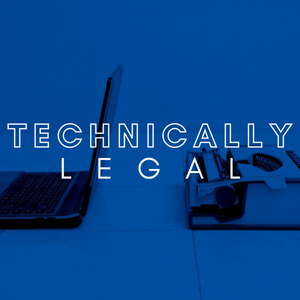
Technically Legal - A Legal Technology and Innovation Podcast
Percipient. LLC
- 27 minutes 56 secondsBest of 2024: Can AltFee Kill the Billable Hour and Bring Transparency to Legal Billing? (Scott & Digby Leigh)
In this Best of 2024 episode, we revisit our conversation with Scott and Digby Leigh, founders of AltFee—a legal tech startup tackling one of the industry’s biggest challenges: the billable hour.
Despite decades of debate, the billable hour still dominates legal billing. Enter AltFee. The app helps legal professionals scope, price, and manage projects using alternative fee arrangements (AFAs), offering clients more transparency and value.
Scott and Digby highlight why AFAs matter now more than ever: as AI reduces time spent on tasks, value-based pricing will become essential. AltFee provides a foundation for law firms to shift away from time-based billing, encouraging lawyers to focus on the actual value of their services—not just the clock. From scoping projects to auditing fees, this conversation explores the future of legal pricing and how AFAs can reshape client relationships for the better.
If you’re curious about innovation in legal tech, or if you’re tired of the constraints of hourly billing, this episode is a must-listen.
Episode Credits
Editing and Production: Grant Blackstock
Theme Music: Home Base (Instrumental Version) by TA2MI
-
Want to keep up to date about new episodes? Technically Legal Update List.
-
Want to learn more about Percipient (percipient.co)?
-
Follow Chad on Linkedin: Chad Main | LinkedIn
-
Follow the podcast on LinkedIn: Technically Legal | LinkedIn
-
Follow the podcast on Instagram: Technically Legal | Instagram
-
Follow the podcast on X: Technically Legal | X
18 December 2024, 7:28 pm -
- 42 minutes 41 secondsBest of 2024: Investing in Legal Tech and the Ingredients of a Successful Start-Up (Zach Posner, The LegalTech Fund)What does it take to build a successful legal tech startup? In this Best of 2024 episode, we revisit our conversation with Zach Posner, co-founder of the LegalTech Fund, an investment fund focused on supporting innovative legal technology companies. Zach’s unique perspective on legal tech investing is rooted in his broad experience, including building an education tech company acquired by McGraw Hill. During our conversation, he shares valuable insights into what makes startups thrive. From the importance of transparent investor updates to fostering frequent, meaningful customer interactions that guide product development. We also explore the LegalTech Fund’s investment focus:
- Tools leveraging contracting data for business insights
- Tech solutions expanding access to legal services
Episode Credits
Editing and Production: Grant Blackstock
Theme Music: Home Base (Instrumental Version) by TA2MI
-
Want to keep up to date about new episodes? Technically Legal Update List.
-
Want to learn more about Percipient (percipient.co)?
-
Follow Chad on Linkedin: Chad Main | LinkedIn
-
Follow the podcast on LinkedIn: Technically Legal | LinkedIn
-
Follow the podcast on Instagram: Technically Legal | Instagram
-
Follow the podcast on X: Technically Legal | X
11 December 2024, 12:01 pm - 49 minutesBest of 2024: Using Agile Project Management to Streamline Legal Workflows (John Grant, The Agile Attorney)
In one of the most popular episodes of 2024, John Grant talks about how legal teams can adopt Agile and Kanban project management methodologies to optimize workflows, correct bottlenecks and increase client satisfaction. John is a lawyer and the founder of The Agile Attorney consultancy.
As John explains, the traditional project management method is waterfall. A technique often used by technology companies, involving a sequential approach where each stage is dependent on the completion of the previous one.
But John is a proponent of the newer, Agile methodology, which emerged from the software development community. It is a flexible approach where tasks are broken down into small increments with minimal planning, and processes are iterative. Agile is one of John’s favorites because he believes it is well suited for legal work.
John also talks about the value of a Kanban board, a visual tool used to manage work at various stages of a process. It typically includes columns such as “To Do,” “Doing,” and “Done”.
So why is he so into project management methodologies? Because despite coming from a long line of lawyers, before he went to law school, he first worked in tech.
Episode CreditsEditing and Production: Grant Blackstock
Theme Music: Home Base (Instrumental Version) by TA2MI
4 December 2024, 12:49 pm - 36 minutes 42 secondsBeyond Billable Hours: Flatiron's Conrad Everhard on a Fixed-Fee and Tech Based Approach to M&A
Conrad Everhard, founder of Flatiron Law Group discusses his career trajectory from Georgetown University to becoming a partner at Big Law firms Jones Day and Brian Cave. He explains why he left BigLaw to found Flatiron Law Group, to provide a more cost effective and efficient way to offer legal services to clients involved in mergers and acquisitions.
To do so, the firm leverages a multi-pronged model: flat fees, low overhead, general contract labor to assist with the more labor intensive parts of an M&A deal, and advanced technology, including the firm's own custom build Deal Driver software that provides the clients with data and other insight about the deals they are working on.
Conrad also talks about his work with Stanford’s Codex project, where he is helping develop an AI based negotiation simulator to train young lawyers in M&A deals. He highlights the importance of capturing the decision-making process of senior lawyers to effectively guide the AI model.
Key Discussion Points & Timestamps:
Transition from Big Law to Entrepreneurship: [0:40 - 13:03]
The Flatiron Model: [14:16 - 26:48]
Work with Codex and AI in Legal Training: [26:48 - 33:00]
Resources & Links:
Flatiron Law website: flatiron.legal
Episode Credits
Production: Grant Blackstock
Theme Music: Home Base (Instrumental Version) by TA2MI
-
Want to keep up to date about new episodes? Technically Legal Update List.
-
Want to learn more about Percipient (percipient.co)?
-
Follow Chad on Linkedin: Chad Main | LinkedIn
-
Follow the podcast on LinkedIn: Technically Legal | LinkedIn
-
Follow the podcast on Instagram: Technically Legal | Instagram
-
Follow the podcast on X: Technically Legal | X
20 November 2024, 10:04 am -
- 32 minutes 53 secondsAn Inside Look at How Atlassian Uses Its Own Tools to Power Legal Workflows and Encourages Thoughtful Adoption of AI (Stan Shepard, General Counsel)
This episode features Stan Shepard, General Counsel of Atlassian, a leading provider of team productivity and collaboration software. Stan discusses his unique career journey from a finance journalist to the current GC of Atlassian. He shares valuable insights into how Atlassian's legal department leverages the company's productivity software products and AI for maximum efficiency.
Episode Highlights:
[00:00:09]: Introduction and Stan's background - Learn about Stan's journey from finance journalist to lawyer at Charles Schwab, and eventually to his current role at Atlassian.
[00:04:00]: Why Stan transitioned from journalism to law - Discover his motivations for pursuing a legal career, including the desire for greater impact and client interaction.
[00:07:00]: The growth of Atlassian's legal department - Hear how the legal team has expanded significantly alongside the company's rapid growth, particularly during the pandemic.
[00:12:39]: How Atlassian's legal team uses their own products - Stan explains how Atlassian's legal department utilizes Jira, Confluence, and other tools to streamline workflows and improve collaboration.
[00:14:10]: AI routing of legal requests - Discover how AI automates the process of routing incoming legal requests to the appropriate specialists.
[00:17:02]: Atlassian's new AI product, Rovo - Learn about Rovo's search, chat, and agent capabilities, designed to enhance teamwork and efficiency.
[00:23:31]: Advice for legal departments adopting AI - Stan provides practical guidance on how legal teams can effectively integrate AI into their workflows.
[00:24:29]: Responsible AI implementation - Stan emphasizes the importance of approaching AI adoption with a focus on ethical considerations and mitigating potential biases.
[00:28:16]: Atlassian's involvement with BSA | The Software Alliance - Learn about Atlassian's advocacy work in the global software industry and their efforts to shape responsible tech policy.
Key Takeaways:
- Embrace continuous learning: Stan's career path underscores the importance of adaptability and a growth mindset.
- Leverage technology for efficiency: Atlassian's legal team exemplifies how technology can optimize legal workflows and improve collaboration.
- Adopt AI responsibly: Stan highlights the need for a thoughtful and ethical approach to AI implementation.
Resources Mentioned:
- Atlassian: www.atlassian.com
- Jira: Atlassian's project management software.
- Confluence: Atlassian's knowledge management software.
- Loom: Atlassian's asynchronous video messaging tool.
- Rovo: Atlassian's new AI product with search and chat functionality.
- Responsible Tech Review Template: A guide for responsible AI development. (Available on Atlassian's website)
- BSA | The Software Alliance: bsa.org
Connect with Stan Shepard:
LinkedIn: Stan Shepard
Episode CreditsEditing and Production: Grant Blackstock
Theme Music: Home Base (Instrumental Version) by TA2MI
-
Want to keep up to date about new episodes? Technically Legal Update List.
-
Want to learn more about Percipient (percipient.co)?
-
Follow Chad on Linkedin: Chad Main | LinkedIn
-
Follow the podcast on LinkedIn: Technically Legal | LinkedIn
-
Follow the podcast on Instagram: Technically Legal | Instagram
-
Follow the podcast on X: Technically Legal | X
6 November 2024, 10:31 am - 31 minutes 56 seconds100-Day Dispute Resolution: New Era ADR is Changing the Game (Rich Lee, CEO)
New Era ADR CEO Rich Lee makes a return appearance to Technically Legal to talk about the company’s cutting-edge platform revolutionizing dispute resolution. Rich first came on the podcast in 2021 right as the company launched. Rich discusses the company's mission to provide a faster, more efficient, and cost-effective alternative to traditional litigation and arbitration, the company’s growth and what he has learned from a few years in.
Key takeaways:
-
New Era ADR offers a unique platform for resolving disputes in under 100 days, significantly faster than traditional methods.
-
The platform leverages technology to streamline processes, reduce costs, and enhance accessibility for all parties involved.
-
New Era ADR boasts a diverse pool of experienced and qualified neutrals, ensuring fair and impartial resolutions.
-
The company's commitment to innovation is evident in its use of data and technology to drive efficiency and transparency.
Timestamps:
-
[00:00:00] Introduction and recap of New Era ADR
-
[00:01:30] Discussion of the platform's features and benefits
-
[00:05:00] How New Era ADR addresses common dispute resolution challenges
-
[00:10:00] The importance of social proof in legal innovation
-
[00:15:00] Attracting and recruiting qualified neutrals
-
[00:20:00] The neutral selection process
-
[00:25:00] Future developments and roadmap for New Era ADR
-
[00:30:00] The impact of New Era ADR on various stakeholders
Resources and Links:
-
New Era ADR website: https://www.neweraadr.com/
23 October 2024, 9:09 am -
- 32 minutes 58 secondsTransforming Mobile Device Forensics: A Conversation with ModeOne CEO Matthew Rasmussen
This episode features Matthew Rasmussen, Founder and CEO of ModeOne, which is an app that provides targeted smart phone data discovery. Matt discusses his journey from a psych major waiting tables to landing a job in eDiscovery in its earliest days-- a job that ultimately helped him land jobs in BigLaw for multiple firms running their litigation technology departments. It was when he was working for O’Melveny & Meyers when he had his "light bulb moment" that led to the creation of ModeOne, a solution addressing the challenges of efficient data collection from mobile devices.
Matt explains how ModeOne works, its benefits over traditional digital forensic collection methods, and how it addresses concerns about evidentiary defensibility. He also highlights the various use cases for ModeOne beyond litigation, including internal investigations, HR matters, and compliance. The conversation delves into ModeOne's development, its unique approach compared to competitors, and its future roadmap, including internationalization and integrations with other platforms like Relativity.
Learn more about Matt.
Key Discussion Points:
-
[0:39] Matt's unconventional path to eDiscovery
-
[3:35] The "light bulb moment" that sparked the idea for Mode One
-
[9:02] How Mode One works and its advantages
-
[11:36] Addressing evidentiary concerns and gaining credibility
-
[19:19] Expanding use cases beyond litigation
-
[22:48] iOS and Android certification process
-
[23:31] Apps and data supported by Mode One
-
[25:18] Mode One's built-in review tool and Relativity integration
-
[28:04] Future roadmap and upcoming features
9 October 2024, 8:33 am -
- 26 minutes 56 secondsFrom Law Firm to Legal Tech Entrepreneur: Why ClaimData’s Jason Heinze Gave Up Legal Practice to Create an App
Jason Heinze originally wanted to be an architect but got into disability law after taking over his father in law’s practice. To establish his client’s disability claims, he would have them manually enter daily notes into a pain journal, but he often had difficulty getting clients to consistently maintain the journals because they might forget and it was a completely manual process.
He thought to himself, there has to be an app for that, but when he looked, he found some that were close, but not exactly what he needed. So, he created his own and called it ClaimData. By using the app, disability claimants can now make pain journal entries via a web app and it will also remind them to enter it.
ClaimData uses a progressive web app model for efficiency and cost-effectiveness. ClaimData integrates with case management systems and plans to expand into personal injury and workers' compensation. The app aims to simplify the evidence-gathering process for attorneys, making it easier to prove disability cases.
25 September 2024, 9:38 am - 36 minutesFrom Bail Hearings to Blockchain Believer and Advocate: DeFi Education Fund’s Amanda Tuminelli (CLO)
Amanda Tuminelli, Chief Legal Officer for the DeFI Education Fund, visits the podcast to discuss her role with the organization and its objectives. (What is DeFi? It is shorthand for Decentralized Finance and the backbone of DeFi is blockchain technology and smart contracts.)
The DeFi Education Fund is a nonpartisan research and advocacy group working to explain the benefits of DeFi, achieve regulatory clarity for the future of the global digital economy, and help realize the transformative potential of DeFi for everyone.
Amanda goes in depth into the DEF’s areas of focus:
-
Research and Advocacy
-
Policymaker Education
-
Messaging for Crypto Companies
-
Research about Blockchain Issues and Regulations
-
Providing “Legal Firepower” to Crypto Causes; and
-
DeFi Project Best Practices
Amanda also discusses how lawyers can pursue a career in crypto and why that wasn’t the case a few years ago. It’s not only an option now because the industry is more mature, but also because of the openness of those in the crypto world and their desire for passionate individuals to join them. To get a job in crypto law, Amanda emphasizes the importance of understanding the technology and finding projects of interest.
So how did Amanda get to the DEF? She started out as a securities and white collar crime lawyer, but a case came along that would change her career trajectory. She was working for Kobre and Kim, a law firm focused on disputes and investigations, when the firm was hired by a client accused of running an illegal crypto mining scheme. To get up to speed on the case and get her client out of jail, she had to dive deep into learning about blockchain technology and that is when she caught the bug. A few years later, a friend and former college friend contacted her about joining the legal team at the DeFI Education Fund and she took them up on it.
Episode CreditsEditing and Production: Grant Blackstock
Theme Music: Home Base (Instrumental Version) by TA2MI
-
Want to keep up to date about new episodes? Technically Legal Update List.
-
Want to learn more about Percipient (percipient.co)?
-
Follow Chad on Linkedin: Chad Main | LinkedIn
-
Follow the podcast on LinkedIn: Technically Legal | LinkedIn
-
Follow the podcast on Instagram: Technically Legal | Instagram
-
Follow the podcast on X: Technically Legal | X
11 September 2024, 9:00 am -
- 43 minutes 2 secondsAffiniPay's Evolution: From Payment Platform to Practice Management Software and Beyond (Dru Armstrong, CEO)
AffiniPay is historically a fintech company with a big presence in legal. Their flagship product is LawPay used by law firms to bill clients and accept payments. Dru joined the company in 2021 and right around that time, the company ventured beyond the world of payment software and acquired MyCase, which is law practice management software used by law firms to keep all case details and documents in a single location, keep track of tasks and streamline client communications.
Growing up, Dru wanted to be a lawyer because she comes from family of lawyers, including her father. She studied law at the University of Chicago, but after a couple of gigs with law firms, she figured out that maybe the law wasn’t for her.
So, she finished her MBA and went to work for Boston Consulting. After a few years as a consultant, she needed a break, and, being somewhat of a foodie, she went to work in the kitchens of some of New York's finest dining establishments.
She took lessons learned from the kitchen into her later work as a co-founder of a baby monitor start-up and ultimately roles as CEO of the property management company Grace Hill and now AffiniPay.
In this episode, Dru talks about:
-
Joining AffiniPay and its mission
-
The company’s acquisition of MyCase and expansion into practice management software
-
Affirm, AffiniPay’s Buy now, pay later product and its impact
-
The company’s AI plans and integration within the platform
-
Core responsibilities of a CEO and what has surprised her in her role as a CEO
-
Want to keep up to date about new episodes? Technically Legal Update List.
-
Want to learn more about Percipient (percipient.co)?
-
Follow Chad on Linkedin: Chad Main | LinkedIn
-
Follow the podcast on LinkedIn: Technically Legal | LinkedIn
-
Follow the podcast on Instagram: Technically Legal | Instagram
-
Follow the podcast on X: Technically Legal | X
Editing and Production: Grant Blackstock
Theme Music: Home Base (Instrumental Version) by TA2MI
28 August 2024, 9:00 am -
- 36 minutes 20 secondsConnecting Main Street to Wall Street: How Data Driven Financial Regulation and Emerging Tech Like Crypto Can Help Bridge the Gap (Lucas Moskowitz - GC, Robinhood)
A conversation with Lucas Moskowitz, General Counsel for financial services company Robinhood. Launched in 2013, Robinhood’s stated mission is to "democratize finance for all" by making it easy for investors to start investing with a few bucks rather than having to be a high roller. Key to this effort is the fact that Robinhood offers commission-free trading and also provides access to cryptocurrencies.
The discussion covers various topics, including:
-
Robinhood’s Mission: Lucas explains Robinhood's mission to democratize finance by breaking down barriers to investing and making it accessible to everyone, regardless of their financial background.
-
Lucas’s Career Path: Lucas shares his unique career journey, transitioning from big law to the SEC, Capitol Hill, and eventually Robinhood. He emphasizes the importance of diverse experiences in shaping his perspective.
-
Regulation in the Financial Industry: Lucas advocates for a data-driven approach to regulation, striking a balance between investor protection and fostering innovation and access.
-
Crypto & Blockchain: The potential of crypto and blockchain technology is explored, with Lucas highlighting their role in making financial markets more efficient.
-
Education: The importance of educating investors about making sound investment decisions and also educating legal professionals about emerging technologies like blockchain and tokenization of assets.
Stay in the know:
-
Want to keep up to date about new episodes? Technically Legal Update List.
-
Want to learn more about Percipient (percipient.co)?
-
Follow Chad on Linkedin: Chad Main | LinkedIn
-
Follow the podcast on LinkedIn: Technically Legal | LinkedIn
-
Follow the podcast on Instagram: Technically Legal | Instagram
-
Follow the podcast on X: Technically Legal | X
14 August 2024, 9:00 am -
- More Episodes? Get the App
Your feedback is valuable to us. Should you encounter any bugs, glitches, lack of functionality or other problems, please email us on [email protected] or join Moon.FM Telegram Group where you can talk directly to the dev team who are happy to answer any queries.
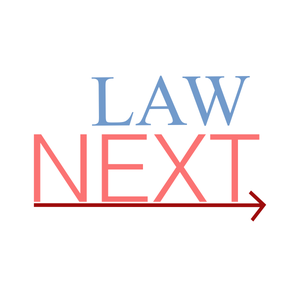 LawNext
LawNext
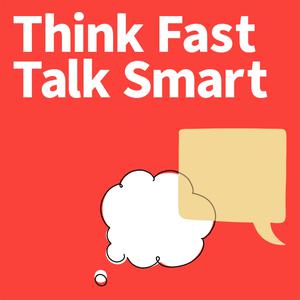 Think Fast Talk Smart: Communication Techniques
Think Fast Talk Smart: Communication Techniques
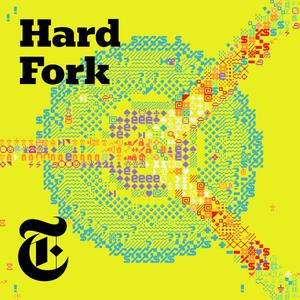 Hard Fork
Hard Fork
 No Priors: Artificial Intelligence | Technology | Startups
No Priors: Artificial Intelligence | Technology | Startups
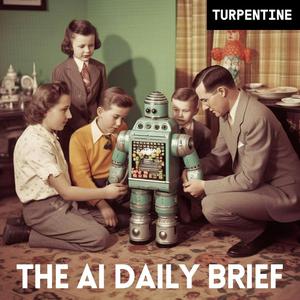 The AI Daily Brief (Formerly The AI Breakdown): Artificial Intelligence News and Analysis
The AI Daily Brief (Formerly The AI Breakdown): Artificial Intelligence News and Analysis
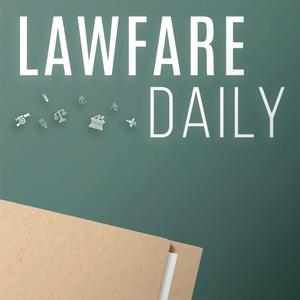 The Lawfare Podcast
The Lawfare Podcast